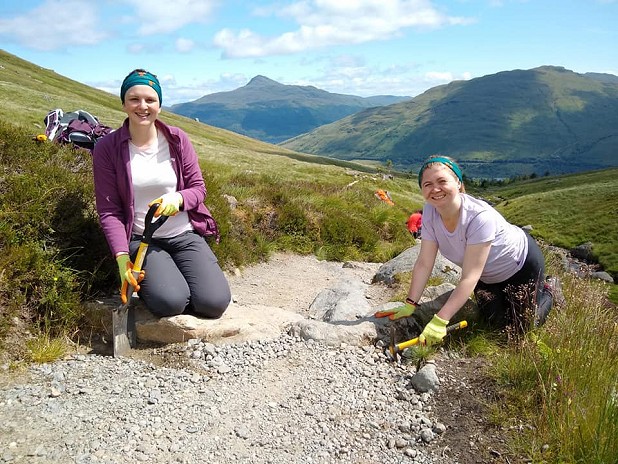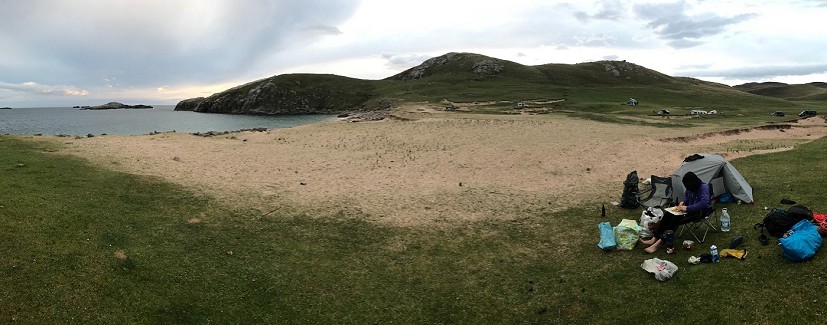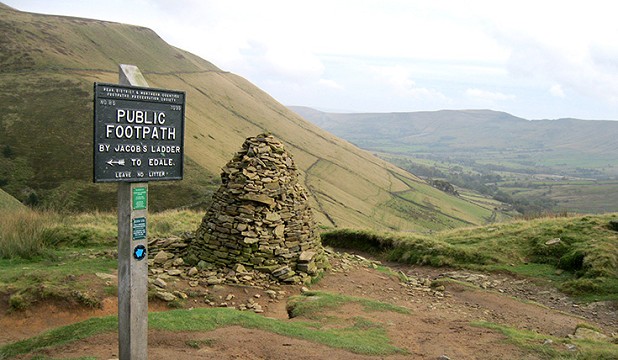Outdoor Use Increases in UK, While Investment and Access Lag
Across the UK, the number of people using green spaces has increased during the pandemic, but facilities and investment have not expanded to meet the growing demand. In fact, some services are being reduced.
A new Scottish survey shows 'alarming' cuts have been made to access jobs.
In a rare show of unity, landowners and outdoor groups in Scotland are jointly calling for better resourcing to support the country's much-lauded access rights, in the face of significant cutbacks in countryside access jobs.

Reduction in paid staff leads to a neglect of access
Scottish Outdoor Access Network (SOAN) polled all 34 access authorities in the country on how they manage access, a topic which has hit the headlines during the Covid era due to the boom in outdoor recreation.
The survey showed that during 2019/20, the equivalent of just 36.5 full-time Access Officers now work across Scotland, down 27% from 2015/16 and a drop of 44% since 2005/6
A third of access authorities do not directly employ any full-time Countryside Rangers; frontline staff who welcome and educate visitors, and manage important sites on the ground. Furthermore, the survey found that six authorities do not employ a single Access Officer. These are skilled professionals who find practical solutions to access challenges, and ensure the local authorities carry out their statutory duties.
SOAN believes the reduction in access-supporting jobs is symptomatic of a wider, worsening trend of under-investment in visitor management. They point out that the Scottish Government's funding for access has remained level for more than a decade - at £8.1million a year - but that many hard-pressed local authorities are choosing to invest their allocation on other issues.
David Henderson-Howat, convenor of the National Access Forum, said: "People here are rightly proud of Scotland's progressive access legislation. Sadly, this survey confirms our fears – expressed in a letter to the Scottish Government earlier this year – that there is an alarming downward national trend in the funding and resources needed to ensure those rights work well on the ground."
He added: "Members of the Forum understand there are competing budget priorities, but we would also highlight the great benefits that access brings in terms of our health and wellbeing. There is a real cost to local communities, land managers and wider society when paths aren't maintained, irresponsible behaviour goes unaddressed or small disagreements are allowed to escalate."

Provision falls short of growing demand
Ironically, the survey results come as increasing numbers of people are accessing the outdoors – with 80% of Scots visiting the outdoors at least once a week this summer according to NatureScot, up from 64% in summer 2019.
"It is good news that so many people are getting active outdoors, but we are also seeing a rising number of access issues - with too few staff to resolve them" said Ramblers Scotland director Brendan Paddy.
"Decision-makers must remember that access funding is a preventative spend, which keeps people healthy and addresses issues before they escalate."
During 2019/20 only one of the 34 Scottish authorities served any section 14 notices; the legal instrument that forces access obstructions to be removed. This highlights a lack of resources, rather than a lack of issues, according to SOAN. Meanwhile, eight authorities held no meetings of their Local Access Forums, statutory bodies which advise the authorities on access matters.
SOAN brings together more than 200 people who work on outdoor access and related issues in Scotland, representing everyone from landowners and managers to sporting bodies and access campaigners. It carried out its survey of access authorities after Covid-related delays affected the Scottish Government's plans to conduct a similar poll.
Meanwhile in England, despite a levelling up agenda, access to parks and the countryside remains very unequal, with people of a lower income or from a BAME background far less able to easily reach green space.
That's according to a report published by the Ramblers south of the border in September, before the second wave of restrictions were introduced in England. Research conducted for the Ramblers' report The grass isn't greener for everyone: Why access to green space matters, found that green spaces are important to almost everyone, with the top reason being that they are a good place to walk (78%).
Two thirds (65%) of adults polled in Great Britain reported that being able to access green space in their local area has always been important to them, while one in five said that it is more important to them now than before the COVID-19 pandemic.
Lack of equity
But Only 57% of those questioned said that they lived within five minutes' walk of green space, be it a local park, nearby field or canal path. That figure fell to just 39% for people from a Black, Asian or Minority Ethnic (BAME) background, and 46% among all GB adults with a household income of under £15,000.
Compare this to 63% of those with a household income over £35,000, and 70% of those who earn over £70,000, and it's clear that we do not all enjoy equal opportunities to get outdoors.
Gemma Cantelo, Head of policy and advocacy for the Ramblers said:
"Walking in nature-filled green spaces makes us happier and healthier... The restrictions of lockdown have made us appreciate our green spaces more than ever, and many of us plan to continue walking more in the future, for our health and wellbeing as well as to get from A to B; but not everyone experienced lockdown equally.
"We need to build on this new momentum and learn the lessons highlighted by the pandemic – people want to visit green spaces on their doorstep where they can be active and enjoy the benefits of connecting with nature. Our towns and cities should be designed to make this a reality, with nature-filled green spaces linked by safe, easy-to-follow walking routes."
Incorporating walking into the planning system
Following a recent consultation on England's planning system, the Ramblers called on the UK Government to reform the system to encourage more walking, including by encouraging local authorities to plan strategically to create both walking networks and green networks.
"In particular, more consideration needs to be given to the connectivity of streets, paths and public spaces" they said.
"The planning system should encourage and support the development of more walking routes in towns and cities to better enable everyone to reach green space for recreation and enjoyment of nature. Furthermore, the public rights of way network and open access land remain key building blocks for leisure walking and for active travel, particularly on the fringes of towns and cities - however these are often overlooked as a way of getting people moving."
Budget cuts in the National Parks and other designated landscapes
Even out in the National Parks and AONBs it's not such a green and pleasant picture at present.
"Designated landscapes are struggling" say the Ramblers.
"After several rounds of budget cuts, and without a renewal of their vigour and purpose, they are not bucking the trend of wildlife loss and habitat degradation and are failing to reach out to the people in our communities who don't yet feel welcome visiting them.
"These should be landscapes for all and they should, once again, have the support and resources to be in the forefront of sustainable landscape management. That's why we've joined with the Campaign for National Parks and other charities, to ask the government to act now, support the landscapes, implement the many positive recommendations of the Glover Review, and unleash the potential of designated landscapes to help us all recover."


